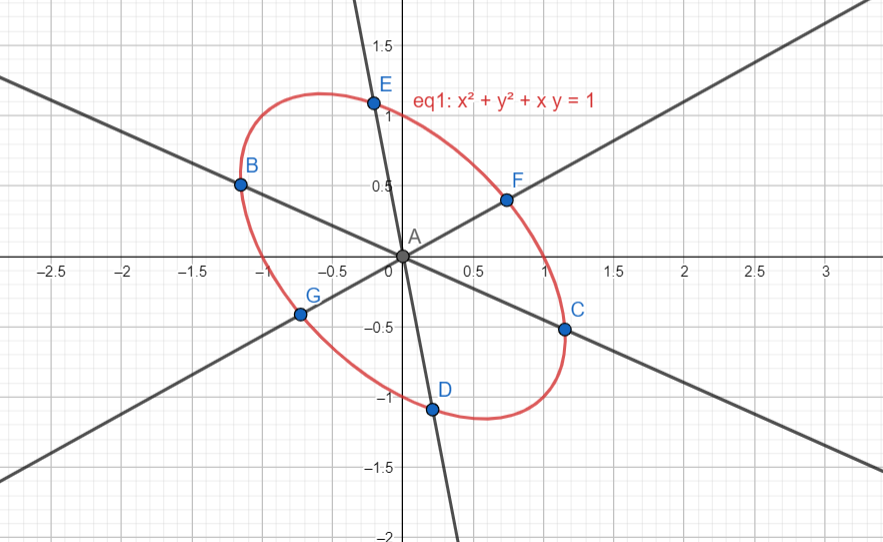
Any chord of the conic ${{x}^{2}}+{{y}^{2}}+xy=1$ passing through the origin is bisected at a point$(p,q)$ then $(p+q+12)$ equals to :
(a) 13
(b) 14
(c) 11
(d) 12
Answer
521.9k+ views
Hint: Make use of the property that says that the centre of a conic bisects every chord that passes through the centre of a conic section.
First, let’s find the centre of this conic section. To find this, let’s first see if the equation changes when we replace $x$ with $y$ and vice versa. If the equation remains unchanged, then that means that the centre of the conic is the origin itself.
Let’s exchange $x$ and $y$ in the equation now. Doing so, we get :
${{y}^{2}}+{{x}^{2}}+yx=1$ which is the same as the original question.
Hence, we know that the centre of this conic is in fact the origin.
It is a property of all conics that every chord drawn in the conic that passes through its centre is bisected by the centre of that conic. Applying this property to this question, since we don’t have one particular chord, and it’s any chord passing through the origin, we can say that $(p,q)$ is actually the centre of this conic. Hence, this point should be equal to the origin since that is the centre of this conic.
$\begin{align}
& (p,q)=(0,0) \\
& \Rightarrow p=0,q=0 \\
& \Rightarrow p+q+12=0+0+12=12 \\
\end{align}$
Hence, $(p+q+12)=12$ in this question.
Note:

Here, A is the centre of the conic, the origin, and as you can see, it bisects every chord that passes through it.
First, let’s find the centre of this conic section. To find this, let’s first see if the equation changes when we replace $x$ with $y$ and vice versa. If the equation remains unchanged, then that means that the centre of the conic is the origin itself.
Let’s exchange $x$ and $y$ in the equation now. Doing so, we get :
${{y}^{2}}+{{x}^{2}}+yx=1$ which is the same as the original question.
Hence, we know that the centre of this conic is in fact the origin.
It is a property of all conics that every chord drawn in the conic that passes through its centre is bisected by the centre of that conic. Applying this property to this question, since we don’t have one particular chord, and it’s any chord passing through the origin, we can say that $(p,q)$ is actually the centre of this conic. Hence, this point should be equal to the origin since that is the centre of this conic.
$\begin{align}
& (p,q)=(0,0) \\
& \Rightarrow p=0,q=0 \\
& \Rightarrow p+q+12=0+0+12=12 \\
\end{align}$
Hence, $(p+q+12)=12$ in this question.
Note:

Here, A is the centre of the conic, the origin, and as you can see, it bisects every chord that passes through it.
Recently Updated Pages
Master Class 11 Computer Science: Engaging Questions & Answers for Success

Master Class 11 Business Studies: Engaging Questions & Answers for Success

Master Class 11 Economics: Engaging Questions & Answers for Success

Master Class 11 English: Engaging Questions & Answers for Success

Master Class 11 Maths: Engaging Questions & Answers for Success

Master Class 11 Biology: Engaging Questions & Answers for Success

Trending doubts
One Metric ton is equal to kg A 10000 B 1000 C 100 class 11 physics CBSE

There are 720 permutations of the digits 1 2 3 4 5 class 11 maths CBSE

Discuss the various forms of bacteria class 11 biology CBSE

Draw a diagram of a plant cell and label at least eight class 11 biology CBSE

State the laws of reflection of light

Explain zero factorial class 11 maths CBSE




